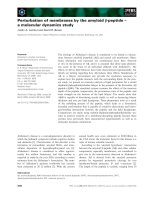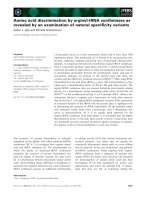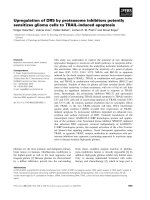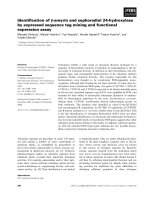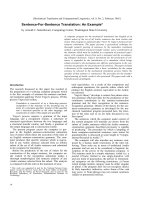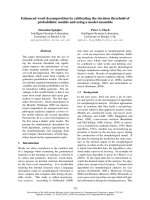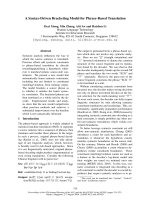Báo cáo khoa học: "Sentence Ordering Driven by Local and Global Coherence for Summary Generation" docx
Bạn đang xem bản rút gọn của tài liệu. Xem và tải ngay bản đầy đủ của tài liệu tại đây (281.23 KB, 6 trang )
Proceedings of the ACL-HLT 2011 Student Session, pages 6–11,
Portland, OR, USA 19-24 June 2011.
c
2011 Association for Computational Linguistics
Sentence Ordering Driven by Local and Global Coherence
for Summary Generation
Renxian Zhang
Department of Computing
The Hong Kong Polytechnic University
Abstract
In summarization, sentence ordering is
conducted to enhance summary readability by
accommodating text coherence. We propose a
grouping-based ordering framework that
integrates local and global coherence concerns.
Summary sentences are grouped before
ordering is applied on two levels: group-level
and sentence-level. Different algorithms for
grouping and ordering are discussed. The
preliminary results on single-document news
datasets demonstrate the advantage of our
method over a widely accepted method.
1 Introduction and Background
The canonical pipeline of text summarization
consists of topic identification, interpretation, and
summary generation (Hovy, 2005). In the simple
case of extraction, topic identification and
interpretation are conflated to sentence selection
and concerned with summary informativeness. In
comparison, summary generation addresses
summary readability and a frequently discussed
generation technique is sentence ordering.
It is implicitly or explicitly stated that sentence
ordering for summarization is primarily driven by
coherence. For example, Barzilay et al. (2002) use
lexical cohesion information to model local
coherence. A statistical model by Lapata (2003)
considers both lexical and syntactic features in
calculating local coherence. More globally biased
is Barzilay and Lee’s (2004) HMM-based content
model, which models global coherence with word
distribution patterns.
Whilst the above models treat coherence as
lexical or topical relations, Barzilay and Lapata
(2005, 2008) explicitly model local coherence with
an entity grid model trained for optimal syntactic
role transitions of entities.
Although coherence in those works is modeled
in the guise of “lexical cohesion”, “topic
closeness”, “content relatedness”, etc., few
published works simultaneously accommodate
coherence on the two levels: local coherence and
global coherence, both of which are intriguing
topics in text linguistics and psychology. For
sentences, local coherence means the well-
connectedness between adjacent sentences through
lexical cohesion (Halliday and Hasan, 1976) or
entity repetition (Grosz et al., 1995) and global
coherence is the discourse-level relation
connecting remote sentences (Mann and
Thompson, 1995; Kehler, 2002). An abundance of
psychological evidences show that coherence on
both levels is manifested in text comprehension
(Tapiero, 2007). Accordingly, an apt sentence
ordering scheme should be driven by such
concerns.
We also note that as sentence ordering is usually
discussed only in the context of multi-document
summarization, factors other than coherence are
also considered, such as time and source sentence
position in Bollegala et al.’s (2006) “agglomerative
ordering” approach. But it remains an open
question whether sentence ordering is non-trivial
for single-document summarization, as it has long
been recognized as an actual strategy taken by
human summarizers (Jing, 1998; Jing and
McKeown, 2000) and acknowledged early in work
on sentence ordering for multi-document
summarization (Barzilay et al., 2002).
In this paper, we outline a grouping-based
sentence ordering framework that is driven by the
concern of local and global coherence. Summary
sentences are grouped according to their
conceptual relatedness before being ordered on two
levels: group-level ordering and sentence-level
ordering, which capture global coherence and local
coherence in an integrated model. As a preliminary
study, we applied the framework to single-
6

